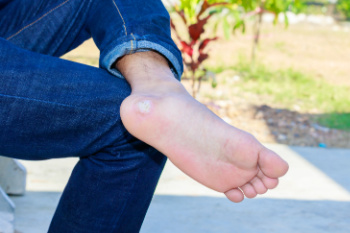Plantar Warts in Children

Plantar warts are a common foot issue in children, caused by the human papillomavirus, abbreviated HPV. These warts typically appear on the soles of the feet and can be painful, especially when walking or standing. Children are more susceptible to plantar warts due to their active lifestyles and frequent exposure to public areas like swimming pools, locker rooms, and playgrounds, where the virus thrives in warm, moist environments. Plantar warts often look like small, rough growths with tiny black dots at the center. While they may go away on their own, treatment can speed up the healing process and relieve discomfort. Options can include, cryotherapy, freezing, or removal by a podiatrist. To prevent plantar warts, encourage kids to wear flip-flops in public areas and keep their feet clean and dry. If your child has a plantar wart, it is suggested that you visit a podiatrist for appropriate treatment.
Plantar warts can be very uncomfortable. If you need your feet checked, contact Terri Quebedeaux, DPM from Agave Podiatry . Our doctor will assist you with all of your foot and ankle needs.
About Plantar Warts
Plantar warts are the result of HPV, or human papillomavirus, getting into open wounds on the feet. They are mostly found on the heels or balls of the feet.
While plantar warts are generally harmless, those experiencing excessive pain or those suffering from diabetes or a compromised immune system require immediate medical care. Plantar warts are easily diagnosed, usually through scraping off a bit of rough skin or by getting a biopsy.
Symptoms
- Lesions on the bottom of your feet, usually rough and grainy
- Hard or thick callused spots
- Wart seeds, which are small clotted blood vessels that look like little black spots
- Pain, discomfort, or tenderness of your feet when walking or standing
Treatment
- Freezing
- Electric tool removal
- Laser Treatment
- Topical Creams (prescription only)
- Over-the-counter medications
To help prevent developing plantar warts, avoid walking barefoot over abrasive surfaces that can cause cuts or wounds for HPV to get into. Avoiding direct contact with other warts, as well as not picking or rubbing existing warts, can help prevent the further spread of plantar warts. However, if you think you have developed plantar warts, speak to your podiatrist. He or she can diagnose the warts on your feet and recommend the appropriate treatment options.
If you have any questions please feel free to contact our offices located in Seguin, LaVernia, Gonzales, and Lockhart, TX . We offer the newest diagnostic and treatment technologies for all your foot and ankle needs.
